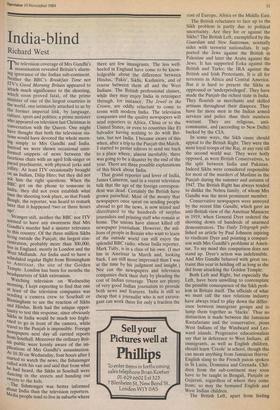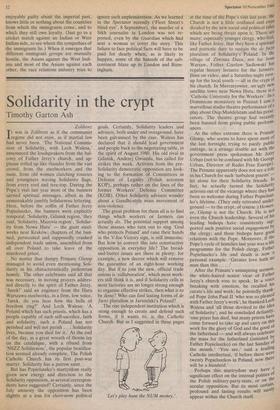India-blind
Richard West
The television coverage of Mrs Gandhi's assassination revealed Britain's alarm- ing ignorance of the Indian sub-continent. Neither the BBC's Breakfast Time nor ITV's Good Morning Britain appeared to attach much significance to the shooting, Which soon proved fatal, of the prime minister of one of the largest countries in the world, one intimately attached to us by the former imperial link, by language, culture, sport and politics; a prime minister Who appeared on television last Christmas in conversation with the Queen. One might have thought that both the television sta- tions would have devoted the whole morn- ing simply to Mrs Gandhi and India. Instead we were shown occasional unin- formed snippets of news between the facetious chats with an aged folk-singer or pseud psychiatrist, with physical jerks and Jollity. At least ITV occasionally brought O n an Indian, Dilip Hiro; but they did not ask him the right questions. When the 1313C got on the phone to someone in India, they did not even establish what time the shooting took place, so that Frank Bough, the reporter, was heard to remark later that it happened 'two or three hours ago,.
Stranger still, neither the BBC nor ITV seemed to have any awareness that Mrs Gandhi's murder had a sinister relevance to this country. Of the three million Sikhs living outside the Punjab, the largest con- centration, probably more than 300,000, bye in England, mostly in London and the West Midlands. Air India used to have a scheduled regular flight from Birmingham to Amritsar, the site of the Golden Temple. London has been for months the headquarters of Sikh extremism. Watching television on Wednesday morning, I kept expecting to find that one at least of the television companies was sending a camera crew to Southall or Birmingham to see the reaction of Sikhs and Hindus. Both had the unique oppor- tunity to test this response, since obviously Sikhs in India would be much too fright- ened to go in front of the camera, while travel to the Punjab is impossible. Foreign newspapers next day all carried reports from Southall. Moreover the ordinary Brit- ish were keenly aware of the im- plications of Mrs Gandhi's assassination. At 10.30 on Wednesday, four hours after I started to watch the news, the fishmonger called with his van and said that from what he had heard, the Sikhs in Southall were dancing in the streets and handing out sweets to the kids.
The fishmonger was better informed about India than the television reporters. Media people tend to live in suburbs where there are few immigrants. The less well- heeled in England have come to be know- ledgeable about the difference between Hindus, `Pakis', Sikhs, Kashmiris, and of course between them all and the West Indians. The British professional classes, while they may enjoy India in retrospect through, for instance, The Jewel in the Crown, are oddly reluctant to come to terms with modern India. The television companies and the quality newspapers will send reporters to Africa, China or to the United States, or even to countries like El Salvador having nothing to do with Bri- tain, but not India. I became aware of this when, after a trip to the Punjab this March, I started to pester editors to send me back to a place where, almost inevitably, there was going to be a disaster by the end of the year. There are three possible explanations of this block about India.
That grand reporter and lover of India, James Cameron, said in a recent television talk that the age of the foreign correspon- dent was dead. Certainly the British have grown parochial. Most of the money that newspapers once spent on sending people abroad to get the news, is now seized and distributed to the hundreds of surplus journalists and printing staff who remain at home. The unions have almost killed off newspaper journalism. However, the mil- lions of people in Britain who want to learn of the outside world can still enjoy the splendid BBC radio, whose India reporter, Mark Tully, is in a class of his own. (I met hm in Amritsar in March and, looking back, I am still more impressed than I was at the time by his judgment and insight.) Nor can the newspapers and television companies duck their duty by pleading the cost of Indian coverage. There are plenty of very good Indian journalists to provide both news and features. India is still so cheap that a journalist who is not exrava- gant can work there for only a fraction the
cost of Europe, Africa or the Middle East. The British reluctance to face up to the Sikh problem is partly due to political uncertainty. Are they for or against the
Sikhs? The British Left, exemplified by the Guardian and New Statesman, normally
sides with terrorist nationalists. It sup- ported the Jews against the British in Palestine and later the Arabs against the Jews. It has supported Eoka against the British and Turks; the IRA against the British and Irish Protestants. It is all for terrorists in Africa and Central America.
But it is hard to present the Sikhs as oppressed or 'underprivileged'. They have made the Punjab the richest state in India.
They flourish as merchants and skilled artisans throughout their diaspora. They have far more men in the Indian armed services and police than their numbers warrant. They are religious, anti- communist, and (according to New Delhi) backed by the CIA.
In some ways, the Sikh cause should appeal to the British Right. They were the most loyal troops of the Raj, at any rate till the second world war. They were hotly opposed, as were British Conservatives, to the split between India and Pakistan.
Indeed Sikhs were considered responsible for most of the murders of Muslims in the Punjab during the summer and autumn of 1947. The British Right has always tended to dislike the Nehru family, of whom Mrs Gandhi was the most prominent member.
Conservative newspapers were annoyed by the recent film Gandhi, which gave an anti-British view of the Amritsar Massacre in 1919, when General Dyer ordered the shooting down of hundreds of unarmed
demonstrators. The Daily Telegraph pub-
lished an article by Paul Johnson aspiring to vindicate Dyer and pointing a compari- son with Mrs Gandhi's problems at Amrit- sar. To my mind this comparison does not stand up. Dyer's action was indefensible.
And Mrs Gandhi behaved with great res- traint this year in holding off as long as she did from attacking the Golden Temple.
Both Left and Right, but especially the Left, have been unwilling to contemplate the possible consequence of the Sikh prob- lem in Britain itself. The officials of what we must call the race relations industry have always tried to play down the differ- ence between immigrant groups and to lump them together as 'blacks'. Thus no distinction is made between the Jamaican Rastafarians and the conservative, pious West Indians of the Windward and Lee-
ward islands. Progressive educationalists say that in deference to West Indians, all immigrants, as well as English children,
should learn 'Creole' in school, though this can mean anything from Jamaican thieves' English slang to the French patois spoken in St Lucia, Dominica and Grenada. Chil- dren from the sub-continent may soon have to be taught in Bengali, Punjabi or Gujerati, regardless of where they come from; so may the bemused English and West Indian children.
The British Left, apart from feeling enjoyably guilty about the imperial past, knows little or nothing about the countries from which the immigrants come, and to which they still owe loyalty. (Just go to a cricket match against an Indian or West Indian side, to see where the sympathies of the immigrants lie.) When it emerges that different immigrant groups are mutually hostile, the Asians against the West Indi- ans and most of the Asians against each other, the race relations industry tries to
ignore such unpleasantness. As we learned in the Spectator recently (`Fleet Street's blind eye', 8 September), the murder of a Sikh journalist in London was not re- ported, even by the Guardian which had sent a woman to cover the story. This failure to face political facts will have to be paid for dearly when, as is likely to happen, some of the hatreds of the sub- continent blaze up in London and Birm- ingham.















































 Previous page
Previous page